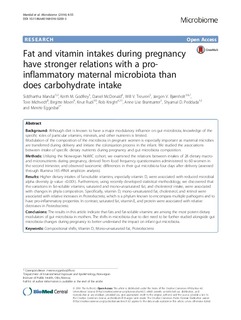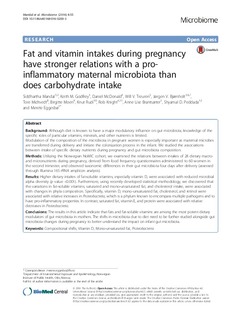| dc.description.abstract | Background Although diet is known to have a major modulatory influence on gut microbiota, knowledge of the specific roles of particular vitamins, minerals, and other nutrients is limited. Modulation of the composition of the microbiota in pregnant women is especially important as maternal microbes are transferred during delivery and initiate the colonization process in the infant. We studied the associations between intake of specific dietary nutrients during pregnancy and gut microbiota composition. Methods Utilizing the Norwegian NoMIC cohort, we examined the relations between intakes of 28 dietary macro- and micronutrients during pregnancy, derived from food frequency questionnaires administered to 60 women in the second trimester, and observed taxonomic differences in their gut microbiota four days after delivery (assessed through Illumina 16S rRNA amplicon analysis). Results Higher dietary intakes of fat-soluble vitamins, especially vitamin D, were associated with reduced microbial alpha diversity (p value <0.001). Furthermore, using recently developed statistical methodology, we discovered that the variations in fat-soluble vitamins, saturated and mono-unsaturated fat, and cholesterol intake, were associated with changes in phyla composition. Specifically, vitamin D, mono-unsaturated fat, cholesterol, and retinol were associated with relative increases in Proteobacteria, which is a phylum known to encompass multiple pathogens and to have pro-inflammatory properties. In contrast, saturated fat, vitamin E, and protein were associated with relative decreases in Proteobacteria. Conclusions The results in this article indicate that fats and fat-soluble vitamins are among the most potent dietary modulators of gut microbiota in mothers. The shifts in microbiota due to diet need to be further studied alongside gut microbiota changes during pregnancy to better understand the impact on infant gut microbiota. | |

